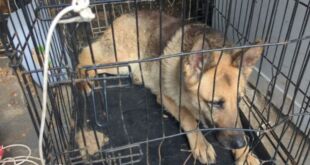Animal rights advocates are criticizing a new policy by the Canadian Food Inspection Agency (CFIA) that will ban the import of dogs from more than 100 countries.
The agency announced it would ban the entry of commercial dogs from countries it considers high-risk for canine rabies beginning on Sept. 28, which is World Rabies Day. The agency says the ban is essential to lessen the risk of dog rabies entering Canada, and defines “commercial dogs” as dogs for resale, fostering, adoption, breeding, show or exhibition, research, and other objectives.
Animal rights activists and rescue shelter workers are concerned about how this will impact helpless dogs in countries with high-kill shelters and dog-culling practices. Many strays live on the street, exposed to the elements and at risk of disease and death.
Dozens of Canadian shelters work with other countries to import adoptable dogs that need care and rescue. This prohibition will put an end to their operations completely.
“It’s shocking that the CFIA didn’t consult with the dog rescue community before implementing this sweeping ban, which may force many organizations to shut down,” said Roxanne Yanofsky, a director of Save A Friend, which rescues dogs from Columbia.
A petition to reverse this ban has been filed by Animal Justice, another organization run by a team of advocates and lawyers fighting for better legal protections for animals in the country.
Currently, Canada has no active cases of dog rabies, which is different from the strain found in raccoons, bats, and other wildlife. However, canines with dog rabies carried the disease when they came to Canada last year. It was a public health risk, and the Public Health Agency of Canada (PHAC) warned against the dangers of such imports.
CFIA said, “The importation of even one rabid dog could result in transmission to humans, pets, and wildlife,” adding that those who contract it only have a 1% chance of survival.
Countries at high risk for dog rabies include Ukraine, India, Brazil, Egypt, Haiti, Peru, and the United Arab Emirates.
Earlier this month, a plane arrived in Toronto from Ukraine carrying 500 canines in its cargo. The CFIA told Daily Hive that 38 of them had died on the flight, and several others were in a critical situation.
Last year, hundreds of dogs were saved from the dog meat industry in South Korea and brought to Canada to be adopted into loving homes.
CFIA is working with PHAC, Canada Border Services Agency, and other government partners to implement this new policy. Moreover, the food agency says it will “explore options to strengthen further the requirements for the import of personal pet dogs and assistance dogs from these countries.”

 DogExpress
DogExpress


















 in Chandigarh, India.
in Chandigarh, India. 
